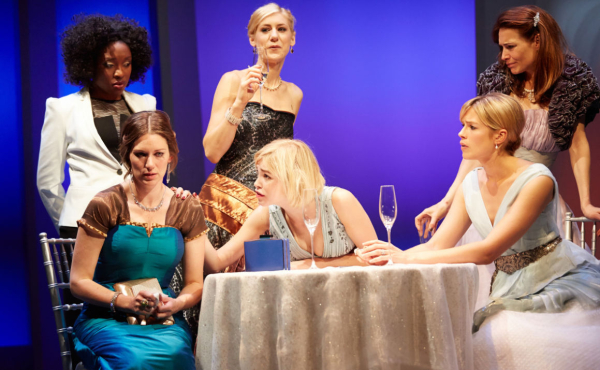The Colby Sisters of Pittsburgh, Pennsylvania (Tricycle)

© Mark Douet
Why? It features five blonde sibling airheads, poor little rich girls from Pittsburgh pouting in chic galleries and restaurants on the Manhattan social scene, shopping for shoes and dressing to kill.
And one of them, a Grace Kelly-like clothes horse called India, is played by Isabella Calthorpe (aka Isabella Amaryllis Charlotte Anstruther-Gough-Calthorpe, truly), an English rose socialite who was once reportedly Prince William's squeeze and is now married to Richard Branson's son and heir.
Okay, having got that out the way, time to fess up that maybe these spoilt and privileged fillies have a downside to their trite little lives: the married ones are caught in a web of promiscuity and unfaithful, boorish husbands, while the baby Mouse (Alice Sanders) is incapable of sustaining a relationship beyond the first bedtime work-out; her latest is an urban homesteader with chickens on the Upper East Side.
And Trip Cullman's gorgeous and cannily cast production is presented as a Vanity Fair photo session, shot against a series of moving studio screens where, in the first scene, the girls gather in extravagant frocks of tulle and satin, ready for their close-up, Mr DeMille; subsequently, unity is shattered by news of domestic squabbles, recriminatory outbursts, tearful breakdowns and… well, it's a bit of a shock.
“The dresses for the gala evening are breathtaking”
“The dresses for the gala evening are breathtaking”
If India is the ice-queen, Patricia Potter's scatter-brained Garden is a melted lollipop, announcing she’s having an affair ("What, another one?") to get back at her adulterous hubby, and Willow (Clare Forlani) a vanilla tub, tasty but bland, with the devastating prospect of having to send a troublesome child to the social death of a state school.
Holding the ring is Charlotte Parry‘s forceful, domineering Gemma, rounding on them all as evidence of dysfunctional behaviour, their father’s brutishness and mother’s probable suicide, seeps through the accumulating acrimoniousness.
Designer Richard Kent and costume supervisor Natasha Ward have dressed this catty cat-walk of a show with real flair and panache. The dresses for the gala evening are breathtaking (and breath-squeezing, in Parry’s case; her waist must be about twelve inches), then there’s a wonderful assortment of little black numbers and – just right for Wimbledon fortnight – some snazzy white sportswear for an onstage tennis match.
This match is much better staged than the one in Terrence McNally‘s Deuce on Broadway, with sound effects for bouncing balls and the kinetic arguments dovetailed with the play and conveyed with a shifting stage from left to right.
Aloft in the umpire’s chair sits the virtually silent, ever-present assistant and gofer, Ronke Adekoluejo‘s Heather. A more obvious sort of play would have given her a big speech. Instead, she merely mutters a couple of times that she has four sisters, too. Enough said.










